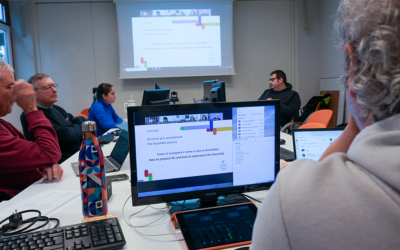400 young people, 56 countries, 16 languages, 4 days: WeGENerate! Last January, myself and Luisa (a friend of mine from Brazil) spoke with 400 Gen (young people of the Focolare Movement) in Trent, Northern Italy. We asked them a question: did they want to be the United World Generation? Did they want to be the generation who will deliver a united world by 2050. 77 years earlier, Chiara Lubich and her friends made a phrase of the Gospel ‘that all may be one’ (Jn 17:21) the aim and mission of their life. When I was at the International Gen 2 Congress ‘WeGENerate’ last month, with a group of young people the same age as Chiara was when she said this ‘Yes’ to the Gospel, I thought for the first time that this Ut Omnes prayer might be a question, rather than a simple statement of prayer. A question, because, this prayer requires an answer. A question because they are not only nice words to pray, but they challenge the reader to live the answer. A question because ‘Ut Omnes’ is a questionable subject and it’s not ‘a given’ that it’s even possible. The question that Luisa and I asked last month (do you want to be the United World Generation?) was only, then, a reformulation of the question that Chiara Lubich answered in 1943. We put a date on the end of the question to see if we, the Gen, really wanted to answer this question. Instead of answering the question with words, the Gen decided to organise. On one of the afternoons, 400 Gen from 56 countries with translation in 16 languages planned local and global actions to fight corruption, lessen inequality, stop climate change, reactivate dialogue and prevent conflict. We answered this Ut Omnes question by planning advocacy training and global formation activities to protect democracy, prevent conflict, fight corruption and stop inequality. We answered this Ut Omnes question by promoting the #CleanPlate, #GreenDay #ClearPlasticJarChallenge and CarPooling campaigns to combat environmental problems. We answered this Ut Omnes question by imagining platforms and apps to unlock dialogue; by breaking down ignorance and building relationships. Mark from Syria answered this question by affirming his intention to return to Syria and help rebuild his country. Victor answered this question by challenging himself to be a living realisation of the charism of unity in Venezuela. Joelle answered this question by promising to bring this message of unity and love back to Lebanon. Contexts which are not dissimilar to the context in which Chiara answered this question in 1943. Many people, like Mark, Joelle and Victor, will make their way to Trent this year to encounter the city that shaped Chiara Lubich. They will visit the exhibition, they will take the tour of the city, they will encounter a community of people who are living to build unity in that beautiful city. They will travel to Trent hoping to understand the roots of Chiara’s story and the story of the Focolare Movement. From my experience at this congress, if you really want to travel to the roots of the story of Chiara Lubich, you need to ask yourself the question that she answered in 1943: that all may be one? And then ask yourself, do you believe it’s possible to be one? And if yes, what am I going to do about it?
Conleth Burns




0 Comments